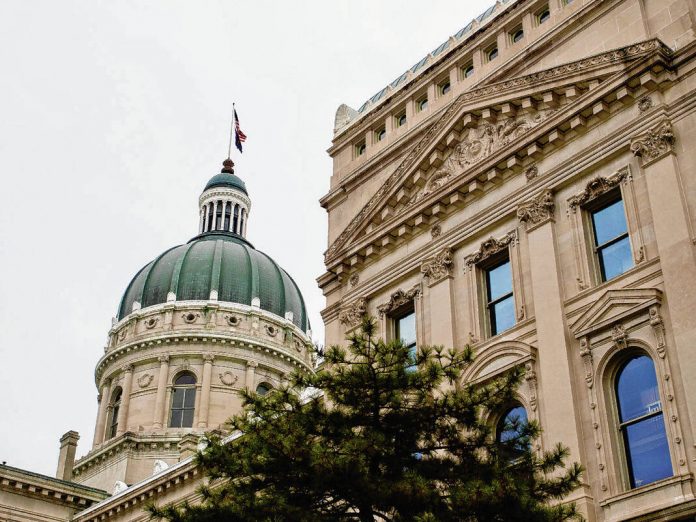INDIANAPOLIS (AP) — Indiana’s new state budget will expand eligibility for its private school voucher program to higher earners and speed up planned income tax rate cuts under a deal announced Wednesday by Republican legislative leaders.
Senate Republicans initially resisted both House-backed moves. But they were included in the budget agreement after an updated tax revenue report released last week showed the state is projected to collect about $1.5 billion, or 2.5% more than previously expected, through July 2025.
Republican leaders said the budget deal increases general K-12 school funding by nearly $1.2 billion, or 8%, over two years. The voucher expansion, however, could take up more than $500 million of that amount by raising the family income limit and lifting other restrictions on qualifying for state money toward private school tuition.
Supporters of the voucher expansion argue it empowers parents to decide which school is best for their children.
Democratic Rep. Greg Porter criticized the voucher expansion as a “despicable” step that will hurt traditional public schools.
The budget agreement comes as the Republican-dominated Legislature faces a deadline this week to conclude this year’s session. House and Senate members could vote Thursday on final passage.
VOUCHER EXPANSION
The voucher expansion includes raising the income limit for a family of four from the current $154,000 to $220,000, and removing a requirement for most families that at least one child had previously attended a public school.
The broader eligibility provisions have been projected to grow the voucher program from the current 53,500 students to some 95,000 students in two years — and nearly double the state money spent on the program to almost $600 million in 2024-25.
Republican Senate President Pro Tem Rodric Bray said many senators were concerned about the voucher expansion’s cost but that projected growth in state tax collections “provided some flexibility.”
Porter, the top Democrat on the budget-writing House Ways and Means Committee, said the additional voucher spending will leave less money for traditional school districts and boosting the state’s lagging teacher pay, while benefiting wealthy families.
“I don’t think the traditional public schools are going to benefit,” Porter said. “At this rate, they’re not even getting an inflationary rate, inflationary dollars, going into their school corporations.”
Republican Gov. Eric Holcomb did not join GOP leaders in announcing the budget deal, nor did any officials from his administration. The governor’s office declined to comment on the agreement.
SCHOOL FUNDING
The Republican plan would leave about $650 million in additional money for traditional public schools and taxpayer-supported charter schools over the next two years. Democrats called that inadequate at a time when the state will have more than $2.5 billion in cash reserves.
The deal includes money to fill a request from Holcomb to eliminate school material and textbook rental fees charged to families — a step estimated to cost about $120 million a year. Indiana is among a handful of states still allowing textbook fees, which Democrats and many education advocates have long criticized as an unfair extra cost to families.
TAX CUT SPEEDUP
The budget deal will speed up individual income tax rate cuts that the Legislature approved a year ago. Under the new plan, the tax rate would decline in small steps from the current 3.15% to 3.05% next year. It would reach 2.9% in 2027 — two years earlier than currently scheduled.
Republicans said the accelerated rate reductions will cut the taxes owed by Indiana residents by about $360 million over the next two years.
The deal, however, does not include any steps toward stemming the double-digit percentage increases in property tax bills that many homeowners are seeing across the state this year because higher sales prices have pushed up property value assessments. Republican House Speaker Todd Huston said he expected legislators would approve some actions to address those increases but acknowledged those wouldn’t reduce property tax payments owed this year to local governments and school districts.
PUBLIC HEALTH EXPANSION
Republican legislators will direct up to $225 million over the next two years toward expanding county health department programs aimed at improving the state’s low rankings in areas such as obesity, smoking and life expectancy. That is about two-thirds of what Holcomb had sought as he made the public health expansion one of his top budget priorities after a state commission found that Indiana’s local public health funding ranks 45th among the states.
Republican legislative leaders generally supported Holcomb’s proposal but settled on the lower funding level after the expansion faced hesitancy among the Legislature’s most conservative members. It also experienced opposition among voters with grievances over government-ordered COVID-19 precautions, who said they feared creeping state control over local health agencies.





